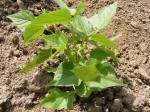News
2016-12-05 | permalink
World Soil Day: Pulses are key to food security and sustainable agriculture
 Pulses combine with soil in a unique symbiosis (Photo: CC0)
Pulses combine with soil in a unique symbiosis (Photo: CC0)
Soil and pulses play a key role in feeding the world, improving soil health and combating climate change, according to a new report published by the UN Food and Agriculture Organization on World Soil Day. This year, the focus of World Soil Day is on the reciprocal relationship between soils and pulses. “Soils and pulses embody a unique symbiosis that protects the environment, enhances productivity, contributes to adapting to climate change and provides fundamental nutrients to the soil and subsequent crops,” said FAO Director-General José Graziano da Silva on December 5. The report highlights how pulses such as lentils, dry beans and chickpeas benefit soil health and improve growing conditions for other plants. FAO says that cereals grown after pulses yield 1.5 tonnes more per hectare than those not preceded by pulses. To generate comparable yields, up to 100 kilograms of nitrogen fertilizer would need to be applied. The report describes pulses as “architects of soil health”. According to the authors, pulses “are responsible for the biological fixation of atmospheric nitrogen and for the solubilisation of phosphate ions from bound forms such as calcium and iron phosphates to make these nutrients available to plants.” Besides their role in the nitrogen and phosphorous cycles, the authors add, “pulses also contribute to increasing soil organic matter, improving soil structure and maintaining soil biodiversity, leading to overall increased soil health.”
In addition, pulses support water filtration, preserve biodiversity, sequester more carbon and increase resilience to a changing climate. The report also discusses the role of pulses in restoring degraded soils and contributing to sustainable soil management. Pressures on soil resources are reaching critical limits: 33 percent of the world’s soils are already degraded due to acidification, salinization, erosion and urbanization, threatening the life-supporting ecosystem services they provide. FAO warns that the world is currently losing soil 10 to 20 times faster than it is replenishing it, a trend pulses can help offset. The report cites a case study in India which showed how the cultivation of pigeon peas reduced soil runoff and erosion by up to 59 percent. In his message on World Soil Day, UN Secretary-General Ban Ki-moon pointed out that sustainable soil management will also advance progress on the 2030 Agenda for Sustainable Development, particularly when it comes to addressing hunger, food insecurity, malnutrition and rural incomes, which is the aim of the second Sustainable Development Goal (SDG). “Pulses can boost soil health while supporting healthier and nutritious diets,” he said. Pulses have a high protein content and can improve the diets of the poorest. But they are also are a significant source of minerals, including iron, magnesium, potassium, phosphorous and zinc. (ab)

